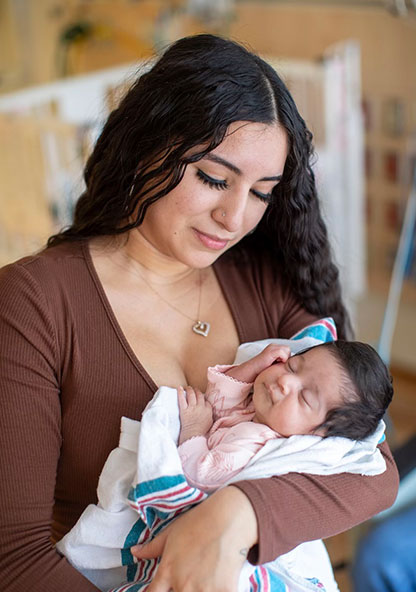The Story of Kali's Victory Over Truncus Arteriosus
When Emma found out that she was pregnant, she was excited to grow her family. Her 4-year-old son was looking forward to being a big brother. Months later, Emma discovered that she was going to have a little girl. She was overjoyed. She decided to name her Kali and in the months that followed Emma’s pregnancy was free of complications.
At 35 weeks and 6 days Emma started having contractions. At first, she thought it was just a little pain, but when the contractions did not go away, she immediately went to South Texas Health System in McAllen, located in the Rio Grande Valley of Texas. Soon after, she welcomed baby Kali to the world.
“I was overjoyed with happiness; Kali became my entire world,” said Emma Olguin.
After she was born, Kali was cared for in the NICU in McAllen. While she was at the hospital, Kali had an echocardiogram or echo test, a diagnostic imaging procedure used to assess the structure and function of the heart. Later that day, Kali’s father went to visit her at the hospital where he was informed about the concerning results of the echocardiogram.
“Kali was 4 days old, and her father called me in a panic. He had just visited her in the hospital, and he said something was wrong with her heart. I also panicked. I did not know what to do or think,” said Emma.
The Discovery of a Congenital Heart Defect
Kali’s parents were told that she would need to be transferred to a higher level of care and to a place with specialized pediatric heart doctors who could assess Kali’s situation. A helicopter soon arrived at the hospital, and it took Kali to CHRISTUS Children’s in San Antonio. Emma headed to San Antonio as well to be with her baby.
“I couldn’t believe it. I thought I had a healthy baby girl and so much was running through my head. When I got to CHRISTUS Children’s I immediately ran in and talked to the doctors. It was a lot to process. After all, she was only 4 days old.”
Doctors at CHRISTUS Children’s told Emma that Kali had a congenital heart defect, called truncus arteriosus. The team assured Emma that Kali was in the right place to have this condition properly cared for.
A Complex Heart Surgery
After Kali was settled into the Neonatal Intensive Care Unit, they were quickly introduced to Dr. Victor Bautista, a thoracic and cardiac surgeon at CHRISTUS Children’s, who told Emma that Kali would need open-heart surgery to treat the truncus arteriosus. Dr. Bautista wanted Kali to gain a little more weight and get stronger before surgery so they would wait a few days before taking her to the operating room. At just 9 days old and weighing 4 ½ pounds, Kali was taken into surgery, and she had one of the most complex heart surgeries an infant can receive.
“The surgery took about four hours. I just prayed and had faith. I trusted the doctors, and I knew Kali would be okay but it is still scary. She was just so little,” said Emma.
To treat truncus arteriosus, surgeons make an incision, typically in the chest, to access the heart. Utilizing a cardiopulmonary bypass machine, the heart's pumping function is temporarily taken over, allowing surgeons to address associated defects like VSD and create separate blood flow. One of the objectives of the surgery is to divide the single large vessel into two, resembling a more typical aorta and pulmonary artery. In some cases, artificial tubes with valves may be used to regulate blood flow.
Throughout the surgery, CHRISTUS Children’s nurses sent Emma text messages, updating her on Kali’s progress during surgery something Kali truly appreciated. Those texts messages provided a lifeline of reassurance for Emma. After each step, Emma knew Kali was closer to making it through surgery and a step closer to going home.
“Dr. Bautista, all of the nurses and the entire team at CHRISTUS Children’s were incredible. They were so kind, caring and supportive in what was a challenging time for me. Not only were they wonderful people, they also had the expertise to perform a complex heart surgery,” said Emma.
A Good Outcome
Finally, the moment the family was waiting for arrived when Dr. Bautista came out of the OR to share an update with Emma. He explained that the surgery was a success and Emma was doing well.
"The moment Dr. Bautista told me that the surgery was a success, a wave of relief washed over me. It was the news every parent hopes to hear. I am beyond grateful for Dr. Bautista, the nurses, and the entire medical team. They saved my baby’s life,” said Emma.
Kali recovered from her surgery in the CHRISTUS Children’s NICU. She received around-the-clock care and attention. As Emma waited for Kali to recover, she was so grateful for the tireless work and support the NICU team delivered every day. She knew while the surgery was a success, the recovery was also extremely important.
“I was so grateful to the NICU team. The attention and dedication really helped me feel at peace in what was an extremely stressful time for me and my family,” said Emma.
What the Future Holds
After truncus arteriosus surgery, patients typically see an improvement in heart function and a better quality of life. In some cases, children may need additional surgeries as they grow. Pediatric patients may outgrow the artificial tubes and valves used during the initial surgery. The need for additional surgeries depends on factors such as the child's overall health, the specifics of the initial surgery, and their natural growth and development.
In Kali’s case, doctors have already said she will need surgeries in the future. Her mom is already prepared for that day. “She’ll be older then and her heart will be stronger,” said Emma.
After spending some time recovering in the hospital Kali was able to go home right after the new year. Her big brother was excited to welcome her to the family.
“What a wonderful way to start 2024. I feel so tremendously blessed and grateful for the team at CHRISTUS Children’s. It is going to be a great year ahead,” said Emma.
For more information about the Heart Center at CHRISTUS Children’s, please visit CHRISTUS Children's Heart Center - San Antonio To learn more about the NICU, please visit CHRISTUS Children's Level 4 NICU - San Antonio.
Truncus arteriosus occurs when only one large blood vessel exits the heart, instead of the usual two, the aorta and the pulmonary artery. This results in a mix of oxygenated and deoxygenated blood, disrupting the normal circulation process. Truncus arteriosus is often accompanied by another defect known as ventricular septal defect (VSD). In cases of VSD there's a hole in the wall of the heart's lower chambers. Truncus arteriosus causes the heart to work harder to get blood to the rest of the body, which is extremely stressful on a baby’s heart. The cause of truncus arteriosus is often unknown, however, family history can be a factor. If it’s left untreated, truncus can lead to congestive heart failure, an enlarged liver, lung damage, high blood pressure in the blood vessels of the lungs and even death.



